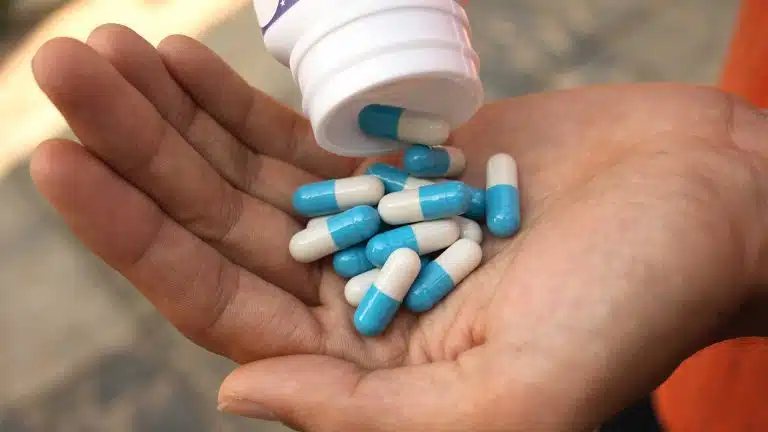Self-Medicating With Alcohol & Other Drugs
- What Is Self-Medication?
- Risks Of Self-Medication
- Signs Of Self-Medication
- What To Do If You’re Self-Medicating

Everyone has bad days, and everyone copes with stress, anxiety, and anger differently.
But when your primary coping mechanism is chronic use or abuse of substances like alcohol, cannabis, prescription medications, or illicit drugs, you may be making the problem worse while risking serious long-term harm.
What Is Self-Medication?
Self-medication refers to the practice of using substances to help manage or cope with the symptoms of mental health issues or other physical or mental states. These can range from serious mental health disorders to everyday stressors or even physical pain.
The ‘self-medication hypothesis’ suggests that if you have a mental health disorder, including mood disorders and anxiety disorders, you will tend to gravitate towards use of specific substances that best help manage your symptoms, at least in the short-term.
However, what begins as self-medication often escalates over time, developing into a full-fledged substance use disorder, otherwise known as alcohol or drug addiction.
How Common Is Self-Medication?
Because the term is used somewhat broadly, it’s hard to say. But according to a 2018 report by the National Institute on Drug Abuse (NIDA), 38% of those who use substances also have a mental health condition.
These co-occurring disorders often include:
- generalized anxiety disorder
- panic disorder
- major depression
- bipolar disorder
- post-traumatic stress disorder
- antisocial personality disorder
- obsessive-compulsive disorder
- phobias
- eating disorders
- schizophrenia
- borderline personality disorder
Risks Of Self-Medication
In general, while drugs or alcohol might have an initial benefit, long-term use becomes increasingly risky and harmful, often making symptoms worse, triggering new symptoms, and complicating future treatment efforts due to comorbidity.
Consider some examples of the risks:
Going Undiagnosed
Suppose you struggle with organization, attention, and forgetfulness, but discover that meth or cocaine help you focus without any other apparent side effects.
You may have adult ADHD, and while self-medicating with stimulant drugs will help with your symptoms in the short term, these illegal drugs are incredibly habit-forming. Each use puts you in financial, legal, and medical jeopardy while leaving your ADHD undiagnosed and untreated.
Developing Alcohol Use Disorder
Alternatively, use of alcohol might help you open up if you’re struggling with social anxiety, or if the stress of life has you feeling like you’re an inch away from breaking down and crying.
But overuse of alcohol can put you in danger of alcohol poisoning or other physical harm. It can also spiral into alcohol use disorder with serious negative effects on your mental and physical health, all while increasing your anxieties over time.
Overdose & Addiction
If you begin taking heroin or diverted opioids because you’re in chronic pain, even pain that you learned to just live with years ago, you risk addiction and overdose, especially when you start taking other depressant drugs or go out to drink.
And the longer you wait to deal with the source of your pain, the harder it may be for doctors or physical therapists to solve the issue when you finally seek treatment.
Signs Of Self-Medication
It’s important to note that self-medication doesn’t fix or resolve the cause of your pain or stress, it only helps cover up the symptoms. Signs that you may be self medicating include:
- turning to alcohol or drugs in response to daily stress or discomfort
- finding your mood, discomfort, and sense of well-being is worse after the effects of the substance wear off
- worrying when you don’t have access to your substance
- devoting more and more time, money, and focus to your substance use over time
- using drugs or drinking because you feel you need to, not that you want to
- taking substances to deal with feelings or memories that happened long in the past
- noticing that your loved ones are beginning to worry
- feeling less happy over time
- having difficulty in school, at work, or in your relationships
- worsening stressors and symptoms over time
- noticing new physical or mental problems
What To Do If You’re Self-Medicating
The line between self-medication and a substance use disorder is blurry. Fortunately, co-occurring disorder treatment/dual diagnosis treatment is available through many treatment programs to help you treat both substance use and underlying mental health conditions.
For many, this treatment likely consists of outpatient treatment sessions, counseling, and therapy. For others, intensive inpatient care may be required to help break the cycle of substance abuse while resolving underlying traumatic memories or addressing an emerging mental illness.
In either case, the sooner you seek professional help and commit to making a positive change, the better your outcomes will ultimately be.
If you or a loved one struggles with substance abuse, or have taken to using substances to deal with stress, trauma, or other mental health challenges, please contact our team today.
Written by Ark Behavioral Health Editorial Team
©2024 Ark National Holdings, LLC. | All Rights Reserved.
This page does not provide medical advice.
National Institute on Drug Abuse (NIDA) - Community Drug Alert Bulletin - Stress & Substance Abuse
National Institute on Drug Abuse (NIDA) - Comorbidity: Substance Use and Other Mental Disorders
National Institute on Drug Abuse (NIDA) - Drug Use and Mental Health Problems Often Happen Together
National Institute on Drug Abuse (NIDA) - What are some signs and symptoms of someone with a drug use problem?
National Library of Medicine: MedlinePlus - Dual Diagnosis

Questions About Treatment?
Ark Behavioral Health offers 100% confidential substance abuse assessment and treatment placement tailored to your individual needs. Achieve long-term recovery.
100% confidential. We respect your privacy.
Prefer Texting?
Our friendly support team is here to chat 24/7. Opt out any time.







 Learn More
Learn More








